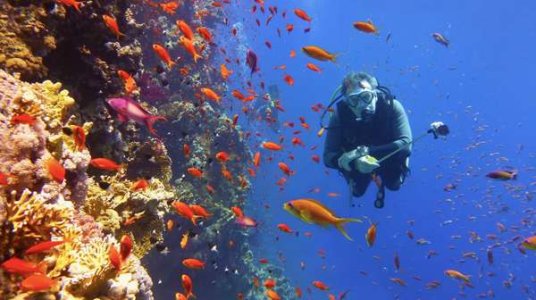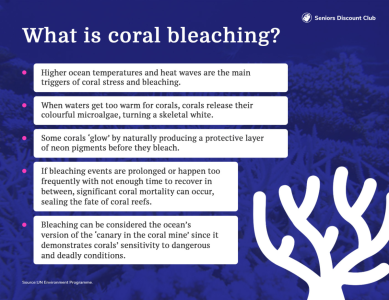Great Barrier Reef escapes 'in danger' tag by UNESCO, but concerns linger over Australia's conservation measures
- Replies 5
No country desires to see its natural wonders listed as in danger. For quite some time now, it appears Australia has been facing this dilemma, as one of its cherished symbols is dangerously close to being included in an international list it wishes to avoid.
Tony Fontes, originally from California and now a resident of Queensland, has spent over forty years contributing to tourism around the Great Barrier Reef.
His passion for diving ignited when he first immersed himself in its clear blue waters in 1979.
Since then, he has dedicated his career to guiding nervous non-swimmers and managing efficient dive vessels and showcasing the wonders of one of the world's largest underwater habitats, essentially operating as a guide in a massive aquatic exhibit.

Unfortunately, his expertise in the international dive community also means he cannot escape fears that, after six mass coral bleaching events between 1998 and 2020, his generation may be the last capable of using the reef for its own benefit.
Mr Fontes shares the concern, saying that while plenty of places exist to explore pristine coral around the reef's massive expanse, such spots are unfortunately disappearing.
'The diving, the snorkelling, the quality of the coral you can find out there today is as good as it was 40 years ago.'
'However, when you look at the reef as a whole, I can definitely say the health of the reef has declined significantly since I started diving it,' he said.
'It's pretty hard to miss a major bleaching event.'
Mr Fontes, who resides in Airlie Beach, emphasised the significant dependence of his community and others in Queensland on the Great Barrier Reef. He stated that approximately 25 to 30 per cent of Airlie Beach's population is employed in some capacity related to the Reef, highlighting its crucial role as an economic hub.
Mr Fontes recalled that up until 2012, stakeholders connected to the reef could actively participate in UNESCO's reef monitoring missions.
However, in recent years, governments have prohibited such engagement. He pointed out that these missions provided an invaluable opportunity for local perspectives to be shared with UNESCO, offering insights into the reef's condition and potential actions for its preservation.
'That (year) was the last time the government allowed that to happen,' he said.
The disastrous decline in the reef's well-being has already put it on UNESCO's watchlist, and it was only through a stroke of luck that the reef narrowly managed to avoid making an 'in danger' listing under the World Heritage Committee's latest draft recommendation.
The report quickly added that the reef is still under 'serious threat' due to global heating and water pollution.
According to UNESCO, the Australian government has taken positive steps to protect the reef since a UN monitoring mission visited Queensland last year.
Nevertheless, UNESCO also effectively warned Australia that the reef's future will need to be reassessed in February before it can be considered for inscription on the 'in-danger' list again in 2024.
Meanwhile, reef scientists are increasingly alarmed by the impending El Niño season, as it increases the risk of another mass bleaching event wreaking havoc on the reef this summer.
The El Niño is an ocean-atmosphere phenomenon that occurs every four to seven years. Its effects can directly influence global weather, temperatures and sea levels.
International Union for Conservation of Nature cited in UNESCO's report that Australia needs to alter its approach to tackle global warming and water pollution drastically:
'The sequence of bleaching events in 2016, 2017, 2019, and 2022, the latter of which occurred during a La Niña year for the first time, are of utmost concern.'
The report lauded the federal and state government's efforts, like legislation to improve emissions targets and a commitment to spend $1.2bn to reduce the pollutants seeping into the reef's waters.
Nevertheless, it also pointed out that its 'progress remains slow' and that Australia must provide a progress report on its efforts to reduce pollution and fishing threats next February.
On these matters, federal environment minister, Tanya Plibersek, said: 'UNESCO's draft decision acknowledges that, under Labor, Australia is once again serious about protecting the reef and acting on climate change.'

The fate of the Great Barrier Reef now hangs on Australia's performance in the upcoming year.
Although we cannot disregard the unfortunate reality that global heating and water pollution are beyond our immediate control, much is still within our power. We can adopt preventive measures in our daily routines to shrink our individual carbon footprints and inspire others to do the same.
Implementing small, impactful changes in our lives can yield significant results. Examples include opting for public transportation, choosing reusable items over disposable plastics, and curbing our water consumption.
What are your thoughts on this news, members? Please share them in the comments section below.
Tony Fontes, originally from California and now a resident of Queensland, has spent over forty years contributing to tourism around the Great Barrier Reef.
His passion for diving ignited when he first immersed himself in its clear blue waters in 1979.
Since then, he has dedicated his career to guiding nervous non-swimmers and managing efficient dive vessels and showcasing the wonders of one of the world's largest underwater habitats, essentially operating as a guide in a massive aquatic exhibit.

UN scientific advisors stated the reef was under 'serious threat' in a report detailing progress on protecting the world heritage site from the climate crisis. Credit: Shutterstock.
Unfortunately, his expertise in the international dive community also means he cannot escape fears that, after six mass coral bleaching events between 1998 and 2020, his generation may be the last capable of using the reef for its own benefit.
Mr Fontes shares the concern, saying that while plenty of places exist to explore pristine coral around the reef's massive expanse, such spots are unfortunately disappearing.
'The diving, the snorkelling, the quality of the coral you can find out there today is as good as it was 40 years ago.'
'However, when you look at the reef as a whole, I can definitely say the health of the reef has declined significantly since I started diving it,' he said.
'It's pretty hard to miss a major bleaching event.'
Mr Fontes, who resides in Airlie Beach, emphasised the significant dependence of his community and others in Queensland on the Great Barrier Reef. He stated that approximately 25 to 30 per cent of Airlie Beach's population is employed in some capacity related to the Reef, highlighting its crucial role as an economic hub.
Mr Fontes recalled that up until 2012, stakeholders connected to the reef could actively participate in UNESCO's reef monitoring missions.
However, in recent years, governments have prohibited such engagement. He pointed out that these missions provided an invaluable opportunity for local perspectives to be shared with UNESCO, offering insights into the reef's condition and potential actions for its preservation.
'That (year) was the last time the government allowed that to happen,' he said.
The disastrous decline in the reef's well-being has already put it on UNESCO's watchlist, and it was only through a stroke of luck that the reef narrowly managed to avoid making an 'in danger' listing under the World Heritage Committee's latest draft recommendation.
The report quickly added that the reef is still under 'serious threat' due to global heating and water pollution.
According to UNESCO, the Australian government has taken positive steps to protect the reef since a UN monitoring mission visited Queensland last year.
Nevertheless, UNESCO also effectively warned Australia that the reef's future will need to be reassessed in February before it can be considered for inscription on the 'in-danger' list again in 2024.
Meanwhile, reef scientists are increasingly alarmed by the impending El Niño season, as it increases the risk of another mass bleaching event wreaking havoc on the reef this summer.
The El Niño is an ocean-atmosphere phenomenon that occurs every four to seven years. Its effects can directly influence global weather, temperatures and sea levels.
International Union for Conservation of Nature cited in UNESCO's report that Australia needs to alter its approach to tackle global warming and water pollution drastically:
'The sequence of bleaching events in 2016, 2017, 2019, and 2022, the latter of which occurred during a La Niña year for the first time, are of utmost concern.'
The report lauded the federal and state government's efforts, like legislation to improve emissions targets and a commitment to spend $1.2bn to reduce the pollutants seeping into the reef's waters.
Nevertheless, it also pointed out that its 'progress remains slow' and that Australia must provide a progress report on its efforts to reduce pollution and fishing threats next February.
On these matters, federal environment minister, Tanya Plibersek, said: 'UNESCO's draft decision acknowledges that, under Labor, Australia is once again serious about protecting the reef and acting on climate change.'
Key Takeaways
- The Great Barrier Reef is at risk of being placed on UNESCO's World Heritage danger list after six mass coral bleaching events between 1998 and 2022.
- A report by UNESCO states that Australia's most extensive coral reef system is under 'serious threat' due to global heating and water pollution.
- UNESCO's report acknowledges Australia's efforts to address the threats. However, it expects a 'drastic shift' to meet water quality targets.
- Reef scientists are concerned that the predicted El Niño climate system will increase the risk of the Reef experiencing another mass bleaching event.
The fate of the Great Barrier Reef now hangs on Australia's performance in the upcoming year.
Although we cannot disregard the unfortunate reality that global heating and water pollution are beyond our immediate control, much is still within our power. We can adopt preventive measures in our daily routines to shrink our individual carbon footprints and inspire others to do the same.
Implementing small, impactful changes in our lives can yield significant results. Examples include opting for public transportation, choosing reusable items over disposable plastics, and curbing our water consumption.
What are your thoughts on this news, members? Please share them in the comments section below.








